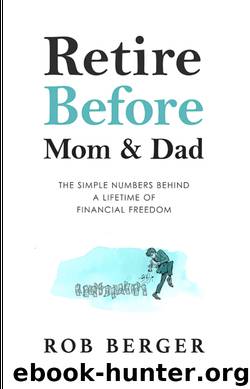Retire Before Mom and Dad by Rob Berger

Author:Rob Berger
Language: eng
Format: epub
Publisher: Glenbrook Press
Published: 2019-08-10T00:38:09+00:00
That doesn’t sound very appealing. Fortunately, there is a bright side to owning stock in a company. We get to share in the profits. Assuming the dry cleaners has a good year, it will have earned a profit. Management then decides how much of the profit to give back to the owners and how much to reinvest back into the company.
Profits returned to the company’s owners are called Dividends. A dividend paid to owners is similar to interest paid to bondholders. There are, however, two big differences.
First, unlike interest payments on a bond, a company is usually not contractually obligated to pay dividends. Second, interest payments on a bond typically are fixed for the life of the bond. That’s why rising interest rates hurt the value of existing bonds. With stock, however, dividends can go up as the profits of the company go up. Of course, they can also go down if profits fall.
So far, we’ve considered a fictional dry cleaners that you and I started. What we’ve learned, however, tells us everything we need to know about the world of investing in publicly traded companies. Just like our dry cleaners, we can invest in either stocks or bonds issued by companies like Apple, Microsoft, and General Motors. We can also invest in bonds issued by governments or municipalities. And the pros and cons of each are no different than with our dry cleaners. The companies and governments are just bigger.
So let’s review.
Stock is ownership in a business. Buying one share of Apple, for example, would make you a part owner. You’d own a very, very, very small part of Apple. But you’d be an owner.
The terms Stock, Share, or Equity are interchangeable. They basically mean the same thing. When you hear a reporter refer to equities, as in “The equity market seems a bit overvalued,” they are referring to stocks in general.
As a part owner of the business, you have a claim on the profits of the business. You can’t literally control the profits. Remember, you own a very, very, very small percentage of the company. But you are still an owner.
When the management of a company like Apple decides to distribute some of the company’s profits to its owners, it declares a dividend. That dividend gets paid out to you in proportion to your percentage of ownership. No different than our little dry cleaners.
A bond is a fancy word for debt. When the government issues a bond, it is borrowing money from investors who purchase the bond. Bonds are sometimes referred to as Fixed Income. Most bonds have a fixed interest rate paid out over a predictable schedule. Savings accounts and CDs are also fixed income investments.
Governments issue bonds, cleverly called Government Bonds. Corporations issue bonds, called Corporate Bonds. Local municipalities issue bonds, called—you guessed it—Municipal Bonds. You can impress your friends by referring to municipal bonds by their nickname, Munis.
Bonds entitle the bond holder to interest payments and the return of their initial investment when the bond reaches its maturity.
Download
This site does not store any files on its server. We only index and link to content provided by other sites. Please contact the content providers to delete copyright contents if any and email us, we'll remove relevant links or contents immediately.
| Budgeting & Money Management | College & Education Costs |
| Credit Ratings & Repair | Retirement Planning |
The Compound Effect by Darren Hardy(8918)
Tools of Titans by Timothy Ferriss(8359)
Nudge - Improving Decisions about Health, Wealth, and Happiness by Thaler Sunstein(7689)
Win Bigly by Scott Adams(7181)
Deep Work by Cal Newport(7056)
Rich Dad Poor Dad by Robert T. Kiyosaki(6591)
Principles: Life and Work by Ray Dalio(6401)
Pioneering Portfolio Management by David F. Swensen(6278)
Digital Minimalism by Cal Newport;(5745)
The Barefoot Investor by Scott Pape(5737)
Grit by Angela Duckworth(5592)
The Slight Edge by Jeff Olson(5405)
Discipline Equals Freedom by Jocko Willink(5371)
The Motivation Myth by Jeff Haden(5202)
You Are a Badass at Making Money by Jen Sincero(4909)
The Four Tendencies by Gretchen Rubin(4592)
Eat That Frog! by Brian Tracy(4509)
The Confidence Code by Katty Kay(4244)
Bullshit Jobs by David Graeber(4176)
